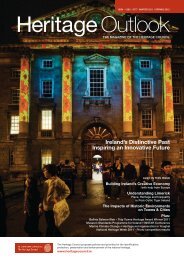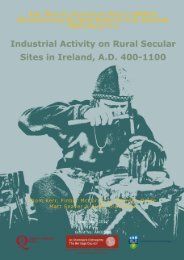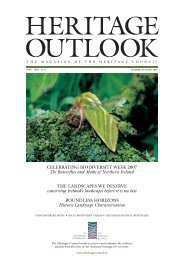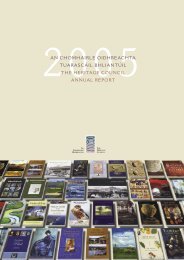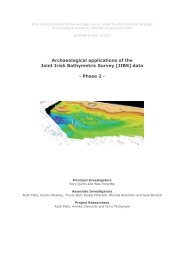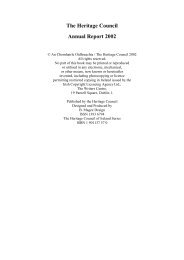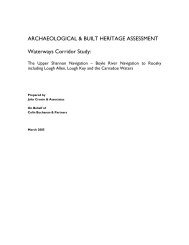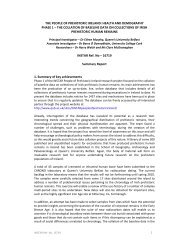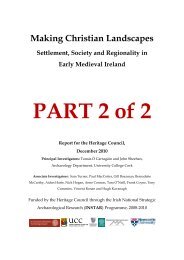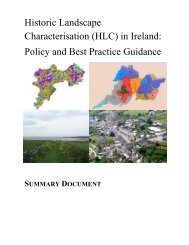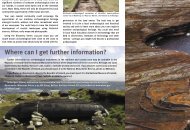- Page 1:
E ARLY M EDIEVAL A RCHAEOLOGY P ROJ
- Page 5 and 6:
Table of Contents TABLE OF CONTENTS
- Page 7 and 8:
Table of Contents St Michael le Pol
- Page 9 and 10:
Table of Contents Knowth Site M, Co
- Page 11 and 12:
List of Figures LIST OF FIGURES Fig
- Page 13 and 14:
List of Figures Fig. 92: Excavated
- Page 15 and 16:
List of Figures Fig. 183: Plan of h
- Page 17 and 18:
List of Figures Fig. 270: Significa
- Page 19 and 20:
Introduction 1.1 Description of thi
- Page 21 and 22:
Introduction Fig. 1: Key to symbols
- Page 23 and 24:
Introduction (commonly referred to
- Page 25 and 26:
Introduction References: Campbell,
- Page 27 and 28:
County Antrim Fig. 2: Significant e
- Page 29 and 30:
Antrim Fig. 4: Plan of Antiville, C
- Page 31 and 32:
Antrim Ballyaghagan, Co. Antrim Ear
- Page 33 and 34:
Antrim Radiocarbon Dates: (PJ Reime
- Page 35 and 36:
Antrim Fig. 8: Plan of Phase 2 hous
- Page 37 and 38:
Antrim Fig. 9: Plan of Ballymacash,
- Page 39 and 40:
Antrim Radiocarbon Dates: (PJ Reime
- Page 41 and 42:
Antrim Fig. 12: Plan of interior of
- Page 43 and 44:
Antrim Fig. 13: Plan of enclosures
- Page 45 and 46:
Antrim Radiocarbon Dates (PJ Reimer
- Page 47 and 48:
Antrim Fig. 15: Plan of Ballyvollen
- Page 49 and 50:
Antrim Ballywee, Co. Antrim Early M
- Page 51 and 52:
Antrim Radiocarbon Dates: (PJ Reime
- Page 53 and 54:
Antrim Fig. 17: Site plan of excava
- Page 55 and 56:
Antrim ‘Craig Hill’ (Craig td.)
- Page 57 and 58:
Antrim Fig. 20: Plan of Craigywarre
- Page 59 and 60:
Antrim The mound was subsequently r
- Page 61 and 62:
Antrim Radiocarbon Dates: (PJ Reime
- Page 63 and 64:
Antrim ‘Doonmore’ (Cross td.),
- Page 65 and 66:
Antrim Fig. 24: Plan of House III a
- Page 67 and 68:
Antrim Fig. 25: Phase I occupation
- Page 69 and 70:
Antrim Dunsilly, Co. Antrim Early M
- Page 71 and 72:
Antrim Killealy, Co. Antrim Early M
- Page 73 and 74:
Antrim ‘Langford Lodge’ (Gartre
- Page 75 and 76:
Antrim Lissue, Co. Antrim Early Med
- Page 77 and 78:
Antrim ‘Meadowbank’ (Jordanstow
- Page 79 and 80:
Antrim Rathbeg, Co. Antrim Early Me
- Page 81 and 82:
Antrim Seacash, Co. Antrim Early Me
- Page 83 and 84:
Antrim Radiocarbon Dates: (PJ Reime
- Page 85 and 86:
Antrim Fig. 37: Plan of interior of
- Page 87 and 88:
Armagh Armagh (Armagh City td.), Co
- Page 89 and 90:
Armagh Fig. 40: Excavations at Cast
- Page 91 and 92:
Armagh Radiocarbon Dates: Abbey Str
- Page 93 and 94:
Armagh Dressogagh, Co. Armagh Early
- Page 95 and 96:
Armagh Terryhoogan, Co. Armagh Earl
- Page 97 and 98:
Clare ‘Beal Boru’ (Ballyvally t
- Page 99 and 100:
Clare Fig. 47: Plan of excavated ar
- Page 101 and 102:
Clare The Harvard excavators identi
- Page 103 and 104:
Clare Cahircalla More, Co. Clare Ea
- Page 105 and 106:
Clare Radiocarbon Dates: (PJ Reimer
- Page 107 and 108:
Clare Clonmoney West, Co. Clare Ear
- Page 109 and 110:
Clare were associated with glass fr
- Page 111 and 112:
Clare wooden bucket, as well as Bro
- Page 113 and 114:
Clare Gragan West, Co. Clare Early
- Page 115 and 116:
Clare Inishcealtra, Co. Clare Eccle
- Page 117 and 118:
Clare Medieval Activity Significant
- Page 119 and 120:
Clare Fig. 53: Excavated areas of I
- Page 121 and 122:
Clare Fig. 54: Plan showing enclosu
- Page 123 and 124:
Clare Fig. 55: Plan of Thady’s Fo
- Page 125 and 126:
Cork Ballyarra, Co. Cork Unenclosed
- Page 127 and 128:
Cork shape was not able to be infer
- Page 129 and 130:
Cork ‘St. Gobnet’s House’ (Gl
- Page 131 and 132:
Cork Banduff, Co. Cork Early Mediev
- Page 133 and 134:
Cork Barrees Valley, Co. Cork Early
- Page 135 and 136:
Cork Brigown, Co. Cork Early Mediev
- Page 137 and 138:
Cork Carrigaline Middle, Co. Cork E
- Page 139 and 140:
Cork Fig. 62: Plan of primary phase
- Page 141 and 142:
Cork Fig. 63: Plan of excavations a
- Page 143:
Cork The following is based on gene
- Page 146 and 147:
Cork Fig. 66: Excavated areas on th
- Page 148 and 149:
Cork apart at one of the lowest lev
- Page 150 and 151:
Cork The Scandinavian main street o
- Page 152 and 153:
Cork Fig. 68: 11-13 Washington Stre
- Page 154 and 155: Cork Fig. 69: Hanover Street/South
- Page 156 and 157: Cork Twelfth century bone-working i
- Page 158 and 159: Cork Hurley, M. F. 1995. Excavation
- Page 160 and 161: Cork Curraheen, Co. Cork Early Medi
- Page 162 and 163: Cork Radiocarbon Dates: (PJ Reimer,
- Page 164 and 165: Cork barrel-padlock and an anvil; a
- Page 166 and 167: Cork Killanully, Co. Cork Early Med
- Page 168 and 169: Cork Radiocarbon Dates: (PJ Reimer,
- Page 170 and 171: Cork flint objects, a rotary quern
- Page 172 and 173: Cork number of post pits and stakeh
- Page 174 and 175: Cork bronze button, bronze brooch,
- Page 176 and 177: Cork ‘Lisnagun’ (Darrary td.),
- Page 178 and 179: Cork Fig. 76: Plan of interior of L
- Page 180 and 181: Cork bracelet, a segmented bead of
- Page 182 and 183: Cork Fig. 78: Excavated areas in Mi
- Page 184 and 185: Cork A total of thirteen struck fli
- Page 186 and 187: Cork A small number of un-stratifie
- Page 188 and 189: Cork sequence of fire debris. The p
- Page 190 and 191: Donegal Dooey, Co. Donegal Early Me
- Page 192 and 193: Donegal Fig. 82: Plan of Rinnaraw C
- Page 194 and 195: Donegal Radiocarbon Dates: (PJ Reim
- Page 196 and 197: Down Ballyfounder, Co. Down Early M
- Page 198 and 199: Down Ballywillwill, Co. Down Early
- Page 200 and 201: Down ‘Clea Lakes’ (Tullyveery t
- Page 202 and 203: Down Crossnacreevy, Co. Down Early
- Page 206 and 207: Down Duneight, Co. Down Early Medie
- Page 208 and 209: Down ‘Dunnyneil Island’ (Dunnyn
- Page 210 and 211: Down Radiocarbon Dates: (PJ Reimer,
- Page 212 and 213: Down Fig. 98: Section of Gransha sh
- Page 214 and 215: Down spreads of gravel and some fir
- Page 216 and 217: Down Fig. 100: Section of Rathmulla
- Page 218 and 219: Down Radiocarbon Dates: (PJ Reimer,
- Page 220 and 221: Down Radiocarbon Dates: (PJ Reimer,
- Page 222 and 223: Down Fig. 103: Excavation at White
- Page 224 and 225: Dublin County Dublin Fig. 105: Sign
- Page 226 and 227: Dublin Ballyman, Co. Dublin Early M
- Page 228 and 229: Dublin Cherrywood (Site 18), Co. Du
- Page 230 and 231: Dublin Fig. 107: Plan of Scandinavi
- Page 232 and 233: Dublin interface of this layer and
- Page 234 and 235: Dublin Scandinavian/Hiberno-Scandin
- Page 236 and 237: Dublin The following is based on ge
- Page 238 and 239: Dublin 1999, 27). Similarly dated s
- Page 240 and 241: Dublin Eleventh Century (Fig. 113)
- Page 242 and 243: Dublin Evidence for two stone walls
- Page 244 and 245: Dublin Fig. 116. Reconstruction of
- Page 246 and 247: Dublin Fig. 118: Plan of Type-2 Hou
- Page 248 and 249: Dublin Excavations occurred directl
- Page 250 and 251: Dublin An amber and jet workshop wa
- Page 252 and 253: Dublin Glebe (Site 43), Co. Dublin
- Page 254 and 255:
Dublin ‘Mount Offaly’, Cabintee
- Page 256 and 257:
Dublin Fig. 122: Phases at Mount Of
- Page 258 and 259:
Dublin a continuation of Ditch C an
- Page 260 and 261:
Dublin Radiocarbon Dates: (PJ Reime
- Page 262 and 263:
Dublin were suggestive of a number
- Page 264 and 265:
Dublin Dubhlinn - a large natural p
- Page 266 and 267:
Dublin Scandinavian warrior burial
- Page 268 and 269:
Dublin Fig. 128: Plan of excavation
- Page 270 and 271:
Dublin Gowen, M. 2001. Excavations
- Page 272 and 273:
Fermanagh ‘Boho’ (Carn td.), Co
- Page 274 and 275:
Fermanagh Coolcran, Co. Fermanagh E
- Page 276 and 277:
Fermanagh ‘Lisdoo’ (Castle Balf
- Page 278 and 279:
Fermanagh Radiocarbon Dates: (PJ Re
- Page 280 and 281:
Galway Ballybrit, Co. Galway Early
- Page 282 and 283:
Galway Carrowkeel, Co. Galway Early
- Page 284 and 285:
Galway Radiocarbon Dates: (PJ Reime
- Page 286 and 287:
Galway Doonloughan, Co. Galway Earl
- Page 288 and 289:
Galway ‘Feerwore Rath’ (Turoe t
- Page 290 and 291:
Galway High Island, Co. Galway Earl
- Page 292 and 293:
Galway Loughbown (1), Co. Galway Ea
- Page 294 and 295:
Galway Loughbown (2), Co. Galway Ea
- Page 296 and 297:
Galway Mackney, Co. Galway Early Me
- Page 298 and 299:
Galway Radiocarbon Dates: (PJ Reime
- Page 300 and 301:
Galway Fig. 146: Excavated area at
- Page 302 and 303:
Kerry County Kerry Fig. 147: Signif
- Page 304 and 305:
Kerry Fig. 148: Plan of site showin
- Page 306 and 307:
Kerry unique mix of architectural c
- Page 308 and 309:
Kerry Bray Head, Valentia Island Ea
- Page 310 and 311:
Kerry House 9 was located at the so
- Page 312 and 313:
Kerry Fig. 151: Plan of early medie
- Page 314 and 315:
Kerry to retain insulating sod for
- Page 316 and 317:
Kerry Fig. 152: Plan of Church Isla
- Page 318 and 319:
Kerry Clogher, Lixnaw, Co. Kerry Ea
- Page 320 and 321:
Kerry Cloghermore, Co. Kerry Cave G
- Page 322 and 323:
Kerry Many of the latest burials fr
- Page 324 and 325:
Kerry A.D. 912-970 Beta-137046 Huma
- Page 326 and 327:
Kerry Fig. 158: Plan of Coarhabeg c
- Page 328 and 329:
Kerry Fig. 159: Plan of Phase 1 hou
- Page 330 and 331:
Kerry ‘Dunbeg Fort’ (Fahan td.)
- Page 332 and 333:
Kerry A stone flagged path linked t
- Page 334 and 335:
Kerry Radiocarbon Dates: Sample No.
- Page 336 and 337:
Kerry inside and on top of the cist
- Page 338 and 339:
Kerry Radiocarbon Dates: (PJ Reimer
- Page 340 and 341:
Kerry House C was a rectangular bui
- Page 342 and 343:
Kerry Loher, Co. Kerry Early Mediev
- Page 344 and 345:
Kerry Reask, Co. Kerry Early Mediev
- Page 346 and 347:
Kerry was excavated within the inte
- Page 348 and 349:
Kerry Fig. 168: Plan of Reask, Co.
- Page 350 and 351:
Kerry References: Fanning, T. 1973.
- Page 352 and 353:
Kildare Killickaweeny, Co. Kildare
- Page 354 and 355:
Kildare Radiocarbon Dates: (PJ Reim
- Page 356 and 357:
Kildare Fig. 173: Prehistoric and e
- Page 358 and 359:
Kildare Radiocarbon Dates: (PJ Reim
- Page 360 and 361:
Kilkenny County Kilkenny Fig. 176:
- Page 362 and 363:
Kilkenny Radiocarbon Dates: (PJ Rei
- Page 364 and 365:
Kilkenny ‘Kilkenny Castle’ (Duk
- Page 366 and 367:
Kilkenny ‘Leggetsrath’ (Blanchf
- Page 368 and 369:
Kilkenny Radiocarbon Dates: (PJ Rei
- Page 370 and 371:
Kilkenny Radiocarbon Dates (PJ Reim
- Page 372 and 373:
Laois Parknahown, Co. Laois Early M
- Page 374 and 375:
Laois Radiocarbon Dates: (PJ Reimer
- Page 376 and 377:
Limerick Ballyduff, Co. Limerick Ea
- Page 378 and 379:
Limerick Ballynagallagh, Co. Limeri
- Page 380 and 381:
Limerick Fig. 185: Ditch and palisa
- Page 382 and 383:
Limerick Fig. 186: Plan of Carraig
- Page 384 and 385:
Limerick shade from light to dark-b
- Page 386 and 387:
Limerick The ‘Spectacles’ (Loug
- Page 388 and 389:
Limerick Coonagh West, Co. Limerick
- Page 390 and 391:
Limerick Croom East, Co. Limerick E
- Page 392 and 393:
Limerick Cush, Co. Limerick Early M
- Page 394 and 395:
Limerick house which utilized the t
- Page 396 and 397:
Limerick 4, Cush 6 and Cush 7 with
- Page 398 and 399:
Limerick The sites at Ballingoola (
- Page 400 and 401:
Limerick Knockea, Co. Limerick Earl
- Page 402 and 403:
Limerick Fig. 193: Plan of Phase 1
- Page 404 and 405:
Limerick about thirty). The last th
- Page 406 and 407:
Limerick Raheennamadra, Co. Limeric
- Page 408 and 409:
Limerick Radiocarbon Dates: (PJ Rei
- Page 410 and 411:
Limerick Fig. 196: Plan of Sluggary
- Page 412 and 413:
Londonderry Big Glebe, Co. Londonde
- Page 414 and 415:
Londonderry Corrstown, Co. Londonde
- Page 416 and 417:
Londonderry Radiocarbon Dates: (PJ
- Page 418 and 419:
Londonderry Oughtymore, Co. Londond
- Page 420 and 421:
Longford County Longford Fig. 202:
- Page 422 and 423:
Longford Fig. 203: Excavated areas
- Page 424 and 425:
Louth County Louth Fig. 204: Signif
- Page 426 and 427:
Louth A stone-lined oval kiln, with
- Page 428 and 429:
Louth The north-eastern area within
- Page 430 and 431:
Louth O’Hara, R. 2009. Early medi
- Page 432 and 433:
Louth Delaney, S. 2010. An early me
- Page 434 and 435:
Louth made from bronze, iron and bo
- Page 436 and 437:
Louth Archaeological monitoring of
- Page 438 and 439:
Louth ‘Lissachiggel’, Doolargy,
- Page 440 and 441:
Louth Fig. 209: Detailed plan of ho
- Page 442 and 443:
Louth Archaeological investigations
- Page 444 and 445:
Louth central, L-shaped island of n
- Page 446 and 447:
Louth Fig. 212: Plan of Marshes Upp
- Page 448 and 449:
Louth Millockstown, Co. Louth Early
- Page 450 and 451:
Louth Radiocarbon Dates: (PJ Reimer
- Page 452 and 453:
Louth Fig. 214: Photograph of soute
- Page 454 and 455:
Mayo County Mayo Fig. 215: Signific
- Page 456 and 457:
Mayo Bofeenaun, Co. Mayo Early Medi
- Page 458 and 459:
Mayo Carrowkeel, Co. Mayo Early Med
- Page 460 and 461:
Mayo Radiocarbon Dates: (PJ Reimer,
- Page 462 and 463:
Mayo Fig. 219: Plan of ecclesiastic
- Page 464 and 465:
Mayo Letterkeen, Co. Mayo Early Med
- Page 466 and 467:
Mayo Fig. 222: Features near entran
- Page 468 and 469:
Mayo Fig. 223: Plan of excavated ar
- Page 470 and 471:
Mayo Moyne, Co. Mayo Early Medieval
- Page 472 and 473:
Meath County Meath Fig. 226: Signif
- Page 474 and 475:
Meath Fig. 227: Plan of excavations
- Page 476 and 477:
Meath Fig. 228: Plan of Augherskea,
- Page 478 and 479:
Meath possibly a foundation deposit
- Page 480 and 481:
Meath Radiocarbon Dates: (PJ Reimer
- Page 482 and 483:
Meath Betaghstown (Bettystown), Co.
- Page 484 and 485:
Meath Boolies Little, Co. Meath Ear
- Page 486 and 487:
Meath Castlefarm, Co. Meath Early M
- Page 488 and 489:
Meath Fig. 231: Enclosures at Castl
- Page 490 and 491:
Meath Cloncowan, Co. Meath Early Me
- Page 492 and 493:
Meath Collierstown 1, Co. Meath Ear
- Page 494 and 495:
Meath enclosure. This ditch contain
- Page 496 and 497:
Meath Radiocarbon Dates: (PJ Reimer
- Page 498 and 499:
Meath Fig. 234: Excavations at Colp
- Page 500 and 501:
Meath Fig. 235: Enclosures at Colp
- Page 502 and 503:
Meath Cormeen, Co. Meath Early Medi
- Page 504 and 505:
Meath bone and finds were few. The
- Page 506 and 507:
Meath Fig. 237: Phases of enclosure
- Page 508 and 509:
Meath Radiocarbon Dates: (PJ Reimer
- Page 510 and 511:
Meath Johnstown 1, Co. Meath Early
- Page 512 and 513:
Meath Radiocarbon Dates: (PJ Reimer
- Page 514 and 515:
Meath Knowth Site M, Co. Meath Earl
- Page 516 and 517:
Meath Radiocarbon Dates: (PJ Reimer
- Page 518 and 519:
Meath belt buckles, bone combs and
- Page 520 and 521:
Meath Lagore (Lagore Big td.), Co.
- Page 522 and 523:
Meath similar huge amounts being re
- Page 524 and 525:
Meath ‘Madden’s Hill’, Kiltal
- Page 526 and 527:
Meath Moynagh Lough, Co. Meath Earl
- Page 528 and 529:
Meath spreads of animal bone were u
- Page 530 and 531:
Meath Nevinstown, Co. Meath Early M
- Page 532 and 533:
Meath disturbed burial appeared to
- Page 534 and 535:
Meath layer of fire-reddened or bur
- Page 536 and 537:
Meath Kelly, E. P. 1981. A short st
- Page 538 and 539:
Meath suggests a network of trade a
- Page 540 and 541:
Meath Beta-196366 Bone from linear
- Page 542 and 543:
Meath Raystown, Co. Meath Early Med
- Page 544 and 545:
Meath former cereal-drying kiln. Th
- Page 546 and 547:
Meath Radiocarbon Dates: (PJ Reimer
- Page 548 and 549:
Meath Roestown 2, Co. Meath Early M
- Page 550 and 551:
Meath Fig. 248: Phases from Roestow
- Page 552 and 553:
Meath St. Anne’s Chapel (Randalst
- Page 554 and 555:
Meath Simonstown, Co. Meath Early M
- Page 556 and 557:
Monaghan County Monaghan Fig. 249:
- Page 558 and 559:
Monaghan have been used for storage
- Page 560 and 561:
Offaly ‘Ballinderry II’ (Ballyn
- Page 562 and 563:
Offaly pins (ninth/tenth century da
- Page 564 and 565:
Offaly Ballintemple, Co. Offaly Ear
- Page 566 and 567:
Offaly Clonmacnoise, Co. Offaly Ear
- Page 568 and 569:
Offaly References: Boland, D. & O'S
- Page 570 and 571:
Roscommon Cloongownagh, Co. Roscomm
- Page 572 and 573:
Roscommon ‘Rathcroghan’, Co. Ro
- Page 574 and 575:
Roscommon Tulsk, Co. Roscommon Earl
- Page 576 and 577:
Sligo County Sligo Fig. 258: Signif
- Page 578 and 579:
Sligo Fig. 259: Post-built structur
- Page 580 and 581:
Sligo Inishmurray, Co. Sligo Early
- Page 582 and 583:
Sligo Knoxspark, Co. Sligo Early Me
- Page 584 and 585:
Sligo References: Mount, C. 1994:20
- Page 586 and 587:
Sligo Fig. 262: Outline plan of Mag
- Page 588 and 589:
Sligo ‘Rathtinaun’ (Lough Gara
- Page 590 and 591:
Sligo discs and 1 rotary quern. The
- Page 592 and 593:
Sligo Sroove (Lough Gara td.), Co.
- Page 594 and 595:
Tipperary County Tipperary Fig. 264
- Page 596 and 597:
Tipperary Fig. 265: Plan of Bowling
- Page 598 and 599:
Tipperary saw the building of the p
- Page 600 and 601:
Tipperary stones, apparently the bo
- Page 602 and 603:
Tipperary Killoran (31), Co. Limeri
- Page 604 and 605:
Tipperary Killoran 66, Co. Tipperar
- Page 606 and 607:
Tyrone County Tyrone Fig. 270: Sign
- Page 608 and 609:
Tyrone Fig. 272: Early medieval Pha
- Page 610 and 611:
Tyrone Fig. 273: Excavation plan of
- Page 612 and 613:
Tyrone Dunmisk, Co. Tyrone Early Me
- Page 614 and 615:
Tyrone Radiocarbon Dates: (PJ Reime
- Page 616 and 617:
Tyrone Fig. 276: Excavated area at
- Page 618 and 619:
Tyrone Mullaghbane, Co. Tyrone Earl
- Page 620 and 621:
Waterford County Waterford Fig. 280
- Page 622 and 623:
Waterford Kilgreany, Co. Waterford
- Page 624 and 625:
Waterford Fig. 282: Plan of Kilgrea
- Page 626 and 627:
Waterford Kill St. Lawrence, Co. Wa
- Page 628 and 629:
Waterford ‘Kiltera’ (Dromore td
- Page 630 and 631:
Waterford Fig. 283: Plan of Kiltera
- Page 632 and 633:
Waterford Little Patrick Street/Bar
- Page 634 and 635:
Waterford Ireland and took up at Po
- Page 636 and 637:
Waterford There is very little tent
- Page 638 and 639:
Waterford eastern half of the earli
- Page 640 and 641:
Waterford Though the archaeological
- Page 642 and 643:
Waterford Wren 1993 & 1998), the va
- Page 644 and 645:
Waterford By the early thirteenth c
- Page 646 and 647:
Waterford Fig. 291: Excavated build
- Page 648 and 649:
Waterford Fragmentary structural re
- Page 650 and 651:
Waterford Large amounts of antler a
- Page 652 and 653:
Waterford Hurley, M.F. 1990:108. Ar
- Page 654 and 655:
Waterford McCutcheon, S. W. J. & Hu
- Page 656 and 657:
Waterford Wallace, P. F. 2005. The
- Page 658 and 659:
Waterford A stone metalled entrance
- Page 660 and 661:
Waterford It has been suggested tha
- Page 662 and 663:
Waterford References: Eogan, J. 200
- Page 664 and 665:
Westmeath Ballinderry I, Co. Westme
- Page 666 and 667:
Westmeath rectangular house, as the
- Page 668 and 669:
Westmeath Clonfad, Co. Westmeath Ea
- Page 670 and 671:
Westmeath Kilpatrick, Killucan, (Co
- Page 672 and 673:
Westmeath Newtownlow, Co. Westmeath
- Page 674 and 675:
Westmeath Rochfort Demesne, Co. Wes
- Page 676 and 677:
Westmeath Togherstown, Co. Westmeat
- Page 678 and 679:
Westmeath Fig. 300: Plan of enclosu
- Page 680 and 681:
Wexford Bride Street, Wexford, Co.
- Page 682 and 683:
Wicklow Giltspur, Co. Wicklow Early
- Page 685:
UCD School of Archaeology



